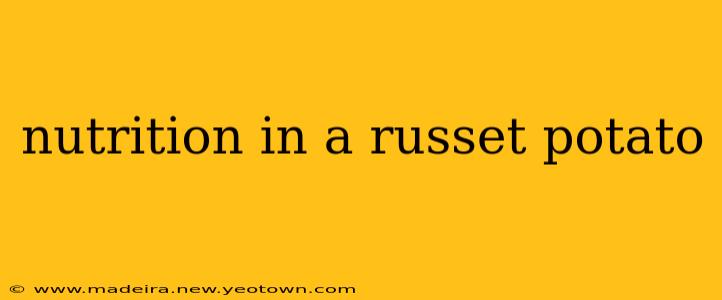The humble russet potato. Often relegated to the side dish category, this starchy tuber deserves a much closer look. It's more than just a fluffy mashed potato or crispy fry; the russet potato boasts a surprisingly impressive nutritional profile, offering a range of vitamins, minerals, and even some fiber. But let's peel back the layers (pun intended!) and explore what exactly makes this potato so nutritious.
What are the main nutrients in a russet potato?
The russet potato is a good source of carbohydrates, providing energy for your body. But it's not just empty carbs; a medium-sized russet potato contains a decent amount of potassium, an essential mineral for maintaining healthy blood pressure. It also offers a respectable amount of vitamin C, a powerful antioxidant crucial for immune function and collagen production. While not abundant in protein, russets still contribute a small amount to your daily intake. And surprisingly, they also provide some vitamin B6, important for brain development and function.
Are russet potatoes healthy?
This is a question with a nuanced answer. The healthiness of a russet potato depends heavily on how you prepare it. A baked potato with a sprinkle of herbs is far healthier than a deep-fried french fry laden with salt and unhealthy fats. The potato itself provides valuable nutrients, but the added ingredients and cooking methods significantly impact its overall nutritional value and caloric content. Focusing on simple preparation methods will allow you to reap the benefits of this versatile vegetable without compromising your health goals.
How many calories are in a russet potato?
A medium-sized russet potato (around 5.3 ounces) contains approximately 110 calories. However, this number can change dramatically based on preparation. Adding butter, sour cream, cheese, or deep-frying will significantly increase the caloric content. Therefore, mindful preparation is key to enjoying the potato without unnecessary calorie overload.
What are the benefits of eating russet potatoes?
Beyond the individual nutrients, eating russet potatoes offers several potential health benefits. The fiber content contributes to digestive health and can help regulate blood sugar levels. The potassium helps maintain healthy blood pressure, and the vitamin C boosts the immune system. Remember though, these benefits are maximized when the potatoes are prepared in a healthy way – think baking, boiling, or roasting rather than deep-frying.
Are russet potatoes good for weight loss?
This is another question that depends on context. Russet potatoes are relatively calorie-dense compared to some other vegetables. However, they are also filling due to their fiber content. Incorporating them into a balanced diet, prepared in a healthy manner, won't necessarily hinder weight loss efforts. It's crucial to be mindful of portion sizes and cooking methods to reap the nutritional benefits without exceeding your daily calorie goals. Substituting healthier cooking methods for deep frying and managing portions is key.
What are the disadvantages of eating russet potatoes?
One potential disadvantage is their relatively high glycemic index (GI). This means they can cause a rapid spike in blood sugar levels, particularly when consumed without other foods or prepared in ways that increase their GI. For individuals with diabetes or insulin resistance, this could be a concern. However, pairing russet potatoes with protein and healthy fats can help mitigate this effect. Another potential downside is their high starch content, which may not be suitable for everyone, especially those with specific dietary restrictions.
In conclusion, the russet potato isn't just a bland side dish. It's a versatile and nutritious vegetable that offers a range of health benefits when prepared healthily and consumed in moderation. Understanding its nutritional profile and preparing it in mindful ways allows you to enjoy this staple food as part of a balanced diet. Remember, the key is moderation and mindful preparation. Enjoy!

